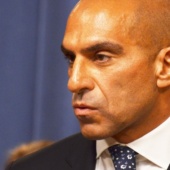Regulators must remain vigilant to prevent repeat of Silicon Valley Bank crisis, Financial Stability Board cautions G20

Article content
Bank managers and financial authorities need to develop ways to react more quickly and effectively to bank runs, such as the one that led to the collapse of California-based Silicon Valley Bank last year, leaders of G20 countries were warned on Monday.
“The March 2023 banking turmoil reminded us that bank runs remain a risk, and that authorities still face challenges in dealing with failing banks,” Klaas Knot, chair of the Financial Stability Board, said in a letter to the international financial group’s member countries, which span North America, Europe, Asia and the Middle East.
Advertisement 2
Article content
“Episodes of market turmoil and the failure of several banks and non-banks in recent years are a stark reminder that vulnerabilities remain within the global financial system.”
Silicon Valley Bank experienced a run on deposits last year, after rising interest rates led to paper losses on its bond holdings, damaging confidence in the bank. Its collapse was followed closely by two other bank failures in the United States and by the forced sale of former European banking powerhouse Credit Suisse Group AG to UBS Group AG.
In the letter, Knot, whose job was held by former Bank Canada and Bank of England governor Mark Carney for seven years through 2018, called on G20 leaders to implement a global set of banking rules that have been unevenly adopted across North America and Europe.
“It is critical for jurisdictions to finalize and implement the agreed reforms so that the financial system can absorb rather than amplify stress,” he wrote, adding that new threats to stability continue to emerge.
“One notable example where further progress is needed is in implementing the finalized Basel III reforms in full, consistently and as soon as possible, particularly in those jurisdictions where implementation remains uncertain in timing and substance.”
Article content
Advertisement 3
Article content
Canada’s bank regulator, the Office of the Superintendent of Financial Institutions (OSFI) initially announced plans to roll out the final rules, but delayed implementing a major element — the output floor regulating the use of internal risk models — for one year after the U.S. Federal Reserve suggested it would water down the final rules, sometimes referred to as Basel III Endgame. U.S. banks lobbied against implementation of the final rules, arguing that they would limit their ability to make loans and hurt the economy. European regulators, meanwhile, have delayed the rollout.
Peter Routledge, OSFI’s superintendent, said in a speech last month that critics have overstated the impact of the final rules, but he said the regulator is still assessing what to do about final implementation and pledged that he would not push Canadian banks further ahead of their global counterparts.
Knot, whose organization was formed in the aftermath of the 2008 financial crisis to stabilize the global financial system, wrote that it is “a clear challenge” that the agreed financial reforms have not yet been fully implemented.
Advertisement 4
Article content
“Against the backdrop of high public and private debt levels and modest GDP growth, the world can ill afford financial instability,” he wrote. “We must redouble our combined efforts to ensure a stable global financial system that can finance the economy without recourse to extraordinary support. Achieving this goal requires globally consistent policy implementation.”
Recommended from Editorial
He said it is up to the leaders of the G20 countries to ensure this happens.
“Rapid progress can only be realized with your political support,” Knot wrote.
• Email: bshecter@nationalpost.com
Bookmark our website and support our journalism: Don’t miss the business news you need to know — add financialpost.com to your bookmarks and sign up for our newsletters here.
Article content






















